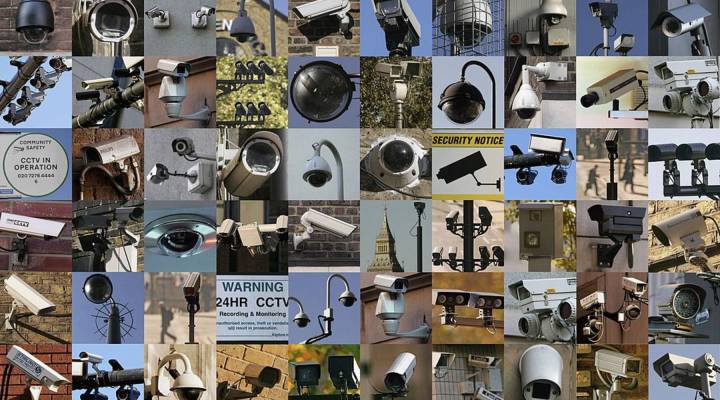
Smile! You’re on camera, and the person watching could be a world away
Share Now on:
Smile! You’re on camera, and the person watching could be a world away

This story is from Codebreaker, our tech podcast that asks “Can it save us?”
Every morning Barbara Morrow, an 80-year-old woman in rural Northern Ireland, wakes up at 6 a.m. and puts on a kettle of water. She makes a cup of coffee, powers up her computer, and quickly checks her Facebook messages. And then? She starts watching live security camera feeds, looking to catch shoplifters.
Morrow spends about five hours a day live streaming security footage, but she’s not a police officer or a trained security guard — she’s a retired shop manager who says she enjoys stopping crimes from the comfort of her home computer.
Morrow uses a website called Internet Eyes. The service first launched in October 2010, promising to prevent crime in shops across the United Kingdom. Tony Morgan, the site’s creator and managing director, says the concept came from two seemingly unconnected observations: people aimlessly surf the web and stores lose money to shoplifting. Internet Eyes was Morgan’s idea of combining the two.
The concept behind Internet Eyes is simple. Shop owners pay a monthly fee to stream their in-store security footage live, and viewers like Morrow subscribe to the service. The site presents the viewers with up to four screens simultaneously. Whenever the viewer spots suspicious activity, they click an alert button that automatically notifies the shopkeeper with video of the flagged footage. The shopkeeper then decides what action to take — confront the accused shoplifter, call the police, or perhaps, do nothing. If the viewer makes a false report, the shopkeeper can report them, which could get the viewer banned from Internet Eyes.
The camera feeds look something like this:
Scrolling through video titles on the Internet Eyes YouTube channel is like reading local crime alerts: “Teenager in Blue Jacket item inside,” “Man Takes Items Leaves Without Paying,” and “Woman adds items to envelope without paying.”
Camera viewers are incentivized with financial rewards. Viewers get points for every crime they successfully report, and those who tally up the most points at the end of the month get a cash prize. Morrow earns somewhere between nothing and $125, depending on the month. Considering the amount of time Morrow spends on the website — about five hours a day — it’s not a lot of money.
Morgan says the real motivation is not financial. “We don’t approach the minimum wage or anything like that. But how many people watch crime series on television?” He continues, “If people think they can actually help, and if people see cameras that come on when there’s something happening, then they will watch it.”
Of course there are privacy concerns with allowing subscribers to watch security footage from their home computers. Internet eyes has come in for some criticism from civil liberty advocates like Big Brother Watch and No CCTV, and this has had an impact on the company. In the early days, Morgan says there were over 4,000 viewers and 160 camera feeds on the site. Today the service has downsized and shifted to clients in South America. Morgan says there are only a couple dozen Brazilian shops monitored by about 240 users around the world.
However, Morgan plans to revive and rebuild Internet Eyes in the coming years. He plans to incorporate artificial intelligence and facial recognition programs to his service, and wants the service to automatically flag what a computer program identifies as suspicious activity, present this footage to an Internet Eyes subscriber, and use facial recognition to identify the possible offender. Morgan also hopes the service can be used outside of retails stores; perhaps with home security systems or on university campuses.
While some may be weary of Internet Eyes and these proposed expansions, Morrow thinks the website is a good idea. She doesn’t see any problem with this type of crowdsourced surveillance. “I just like catching shoplifters,” Morrow chuckles. “I think I should’ve been a vigilante or something.” Morrow says she wants to watch shops in the United States someday. And Morgan? If he can get enough investment, he also wants to bring his service to the U.S.
Stay updated on all things Codebreaker.
There’s a lot happening in the world. Through it all, Marketplace is here for you.
You rely on Marketplace to break down the world’s events and tell you how it affects you in a fact-based, approachable way. We rely on your financial support to keep making that possible.
Your donation today powers the independent journalism that you rely on. For just $5/month, you can help sustain Marketplace so we can keep reporting on the things that matter to you.


















